
- 1. Understanding Lock Malfunctions in Extreme Weather
- 2. Common Causes of Lock Malfunctions in Extreme Weather
- 3. Preventive Lock Maintenance Tips for Extreme Weather
- 4. How to Weatherproof Your Locks
- 5. How to Avoid Lock Freezing in Cold Weather
- 6. Choosing Weather-Resistant Locks for Better Durability
1. Understanding Lock Malfunctions in Extreme Weather
Extreme weather conditions—whether it’s frigid winter temperatures or scorching summer heat—can have a significant impact on the performance of your locks. Over time, these weather extremes can cause locks to malfunction, become jammed, or even fail to work altogether. For homeowners and business owners alike, understanding how weather affects locks is essential for taking proactive steps to avoid disruptions.
Locks are intricate mechanical devices that rely on precise components to operate smoothly. When exposed to extreme weather, these components can expand, contract, freeze, or become lubricated improperly, all of which can lead to malfunction. To ensure the continued functionality of your locks, it’s crucial to follow proper maintenance and care, especially during seasonal transitions.
2. Common Causes of Lock Malfunctions in Extreme Weather
Extreme weather conditions can cause a variety of issues with your locks, some of which are easily preventable with proper care. Here are the most common causes of lock malfunctions during extreme weather:
2.1 Freezing and Ice Build-Up
In colder climates, freezing temperatures can cause moisture inside the lock mechanism to freeze, resulting in a jammed or non-functioning lock. Ice buildup within the lock cylinder can also prevent the key from turning, making it impossible to open the door.
2.2 Expansion and Contraction
When the temperature fluctuates, metal lock components expand and contract. This can lead to stiffness in the lock, preventing it from opening or closing smoothly. The locking mechanism may become misaligned, causing malfunctioning and difficulty in locking or unlocking doors.
2.3 Dust and Debris Buildup
Hot weather, combined with dry air, can lead to dust and debris accumulation in locks. These particles can get into the internal mechanisms of the lock, causing it to seize or function improperly. This is especially problematic for outdoor locks, which are more exposed to the elements.
3. Preventive Lock Maintenance Tips for Extreme Weather
Preventive maintenance is key to keeping your locks in optimal condition, no matter the weather. Here are a few tips to ensure your locks function smoothly through extreme temperatures:
3.1 Regular Lubrication
Lubricating your locks regularly is one of the best ways to prevent malfunctions. In cold weather, moisture inside the lock can freeze, making it hard to operate. Applying a graphite lubricant or dry silicone spray can help prevent the lock from freezing and ensure smoother operation. Avoid using oil-based lubricants, as they attract dust and debris.
3.2 Clean and Clear Lock Mechanisms
Keep your locks free from dirt and debris, especially in hot weather when dry dust can accumulate quickly. Use compressed air to clear out dirt from the keyhole and lock mechanism. Regularly cleaning the lock ensures smooth movement of the internal components, preventing jams and malfunctions.
3.3 Protect Outdoor Locks
Outdoor locks are particularly vulnerable to the elements. Use protective covers for your exterior locks or install weather shields to prevent rain, snow, and dirt from entering the lock. Additionally, using a lock with a waterproof casing can add an extra layer of protection during extreme weather.
4. How to Weatherproof Your Locks
Weatherproofing your locks is an essential step in extending their lifespan and ensuring their functionality during extreme weather. Here are some simple ways to weatherproof your locks:
4.1 Use a Lock Protector
Lock protectors are a great investment, especially for outdoor locks. These small, simple devices fit over the lock and shield it from rain, snow, and other environmental factors. Lock protectors can help prevent rusting, freezing, and buildup of dust or dirt.
4.2 Apply Silicone Spray
Silicone spray is an excellent weatherproofing solution for locks. It repels water and helps protect the lock against corrosion. By applying silicone spray to your locks, you can protect them from moisture buildup during cold or wet weather, preventing freezing and sticking issues.
4.3 Install Weather-resistant Locks
For maximum protection, consider investing in weather-resistant locks. These locks are designed to handle the harsh effects of extreme temperatures, rain, and humidity. They are constructed with corrosion-resistant materials, ensuring long-lasting durability even in the harshest weather conditions.
5. How to Avoid Lock Freezing in Cold Weather
Freezing is one of the most common issues with locks in cold weather. When moisture inside the lock mechanism freezes, it can cause significant damage or prevent the lock from operating altogether. Here are a few tips to avoid lock freezing:
5.1 Keep Locks Dry
Moisture is the main culprit behind freezing locks. Keep your locks dry by covering them during rain or snowstorms. You can also use a lock de-icer or dry silicone spray to prevent moisture buildup inside the lock. Be cautious not to use water-based de-icers, as they can freeze at lower temperatures.
5.2 Store Spare Keys in a Safe Place
In case your lock freezes, always have a spare key stored in a safe, accessible place. This ensures that you can still get into your home or car if your primary lock is frozen or malfunctioning. You can also invest in a keyless entry system to avoid the hassle of dealing with frozen locks altogether.
5.3 Use a Heated Keychain
A heated keychain is a simple but effective solution for preventing lock freezing. Some keychains are designed with a small heating element that you can activate to warm up the key before using it in the lock. This can be especially helpful if you live in extremely cold areas.
6. Choosing Weather-Resistant Locks for Better Durability
When selecting locks for extreme weather conditions, it's important to choose ones that are specifically designed to resist the elements. Weather-resistant locks are typically made from high-quality materials such as stainless steel, brass, or coated with a protective finish that prevents rusting and corrosion.
6.1 Look for Corrosion-Resistant Materials
Corrosion-resistant materials are essential for locks exposed to outdoor elements. Stainless steel and brass are some of the best materials for weather-resistant locks, as they can withstand moisture and temperature fluctuations without rusting or degrading.
6.2 Choose Locks with Weatherproof Seals
Locks that come with built-in weatherproof seals are a great option for extreme weather. These seals prevent moisture from entering the lock mechanism, protecting the internal components and keeping the lock operational even in freezing or rainy conditions.
In conclusion, preventing lock malfunctions in extreme weather requires proper maintenance and the use of weather-resistant products. By following these locksmith tips, you can ensure that your locks remain functional and secure, no matter what Mother Nature throws your way. For more advice and high-quality locks, visit [Locksmith Finder] to find the best products and services for your needs.




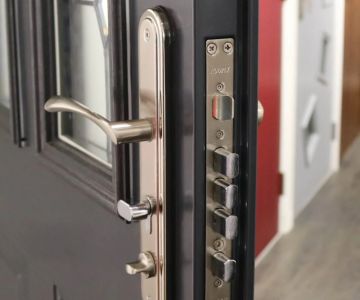
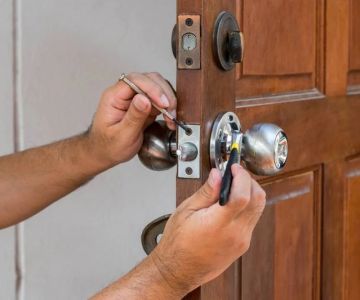

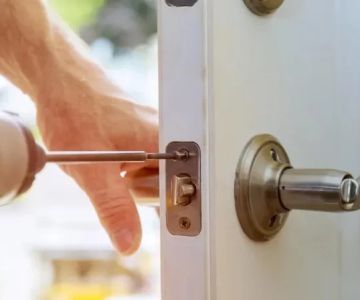
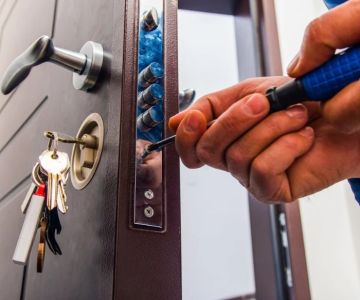
 KeyMe Locksmiths4.0 (24 reviews)
KeyMe Locksmiths4.0 (24 reviews) DuPage Security Solutions, Inc.4.0 (47 reviews)
DuPage Security Solutions, Inc.4.0 (47 reviews) KeyMe Locksmiths4.0 (30 reviews)
KeyMe Locksmiths4.0 (30 reviews) Minute Key5.0 (1 reviews)
Minute Key5.0 (1 reviews) Minute Key4.0 (12 reviews)
Minute Key4.0 (12 reviews) KeyMe Locksmiths2.0 (3 reviews)
KeyMe Locksmiths2.0 (3 reviews) How to Secure Your Garage with Smart Lock Technology
How to Secure Your Garage with Smart Lock Technology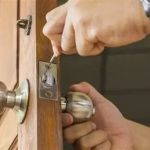 How to Protect Your Home from Lock Cracking: Locksmith Tips for Maximum Security
How to Protect Your Home from Lock Cracking: Locksmith Tips for Maximum Security How to Protect Your Business With Layered Locksmith Solutions
How to Protect Your Business With Layered Locksmith Solutions How to Secure Your Shed: Locksmith Solutions for Maximum Protection
How to Secure Your Shed: Locksmith Solutions for Maximum Protection How to Protect Your Home From Burglars Using Technology and Locks
How to Protect Your Home From Burglars Using Technology and Locks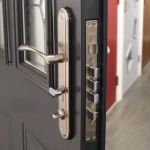 How to Secure Your Front and Back Doors With Deadbolts
How to Secure Your Front and Back Doors With Deadbolts